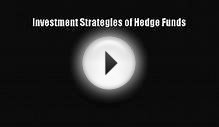
 Money spent on the high fees that come with investing in hedge funds might seem to have been a waste over the last six years, considering the performance of traditional assets. But with the bull market in stocks now very long in the tooth and interest rates at historic lows, hedge funds are looking like an attractive alternative to investors worried about their portfolios.
Money spent on the high fees that come with investing in hedge funds might seem to have been a waste over the last six years, considering the performance of traditional assets. But with the bull market in stocks now very long in the tooth and interest rates at historic lows, hedge funds are looking like an attractive alternative to investors worried about their portfolios.
"This market has been driven by the Fed since 2009, and the easy money has been made, " said Charles Gradante, managing principal of the Hennessee Group, an investment consultant focused on hedge fund research and manager selection. "Most people want to stay in equities, but they also want a more hedged investment management style."
Dave and Les Jacobs | Blend Images | Getty Images
Alternatives are now available in increasing variety to all levels of investors. Liquid alternative mutual funds (also called 1940 Act funds) offer a wide range of hedge fund-like trading strategies in a publicly traded format. They are expensive, however, and their performance has not been good since the financial crisis.
"A lot of money is going into the '40 Act funds, but people have to be careful which ones they choose, " said Don Steinbrugge, founder of Agecroft Partners, which represents hedge funds to institutional and high-net-worth investors.
He added, "Most of them are not very good. The alpha [non-market-related return] of many hedge funds comes from investing in illiquid assets that mutual funds can't invest in."
True hedge funds remain accessible only to the wealthiest investors — those with more than $200, 000 in annual income or a net worth of over $1 million, not including the value of their home. While the investment minimums for many hedge funds have fallen as competition for assets has increased, the biggest and most successful funds still require $500, 000 to $1 million or more to get in the door.
If you have the money and want to construct a portfolio of hedge funds or add a hedge fund allocation to an existing portfolio of other assets, be prepared to put in some time and effort to do it right. It requires a lot more due diligence than picking stocks and bonds does. Investment consultants suggest the following three rules should apply to any investor thinking about committing money to hedge funds.
1. Get help. If you're a high-net-worth investor, chances are you already have a financial advisor helping you manage your money. They can be particularly useful vetting hedge funds and helping you understand the investing strategies that managers employ.
"The due diligence can be a full-time job, and most people don't have the time or interest in doing it, " said Brian Jacobsen, chief portfolio strategist at Wells Fargo Funds Management. "I recommend having an accountant, financial advisor or tax attorney guide you through the process. They can put their credibility on the line."
Gradante at the Hennessee Group suggests that vetting funds on your own is a big mistake. "Doing the legwork on your own is out of the question, " he said. "Individuals need a third party to help with the due diligence."
"There's an aura of opacity in the hedge fund world. Investors deserve transparency."That will add another layer of cost, but it will enable you to get a better idea of the managerial talent of the fund and a clearer understanding of their investment process. It will also likely get you better access to a wider range of options.
Gradante says investors with between $500, 000 and $5 million who want a diversified portfolio of hedge funds should consider investing in a fund of funds rather than assembling it themselves.
2. Know your goals. What do you want from a hedge fund investment? That's the first question that investors need to ask themselves, according to Jacobsen at Wells Fargo Funds Management.
The biggest benefit of most hedge funds is not that they will help you beat the market, but that they will deliver a return not closely correlated to it. A sizable allocation to hedge funds will cushion the blow from big declines in stock and bond portfolios, but it will also be a drag on performance when the markets are strong, as they have been for the last six years.
YOU MIGHT ALSO LIKE











